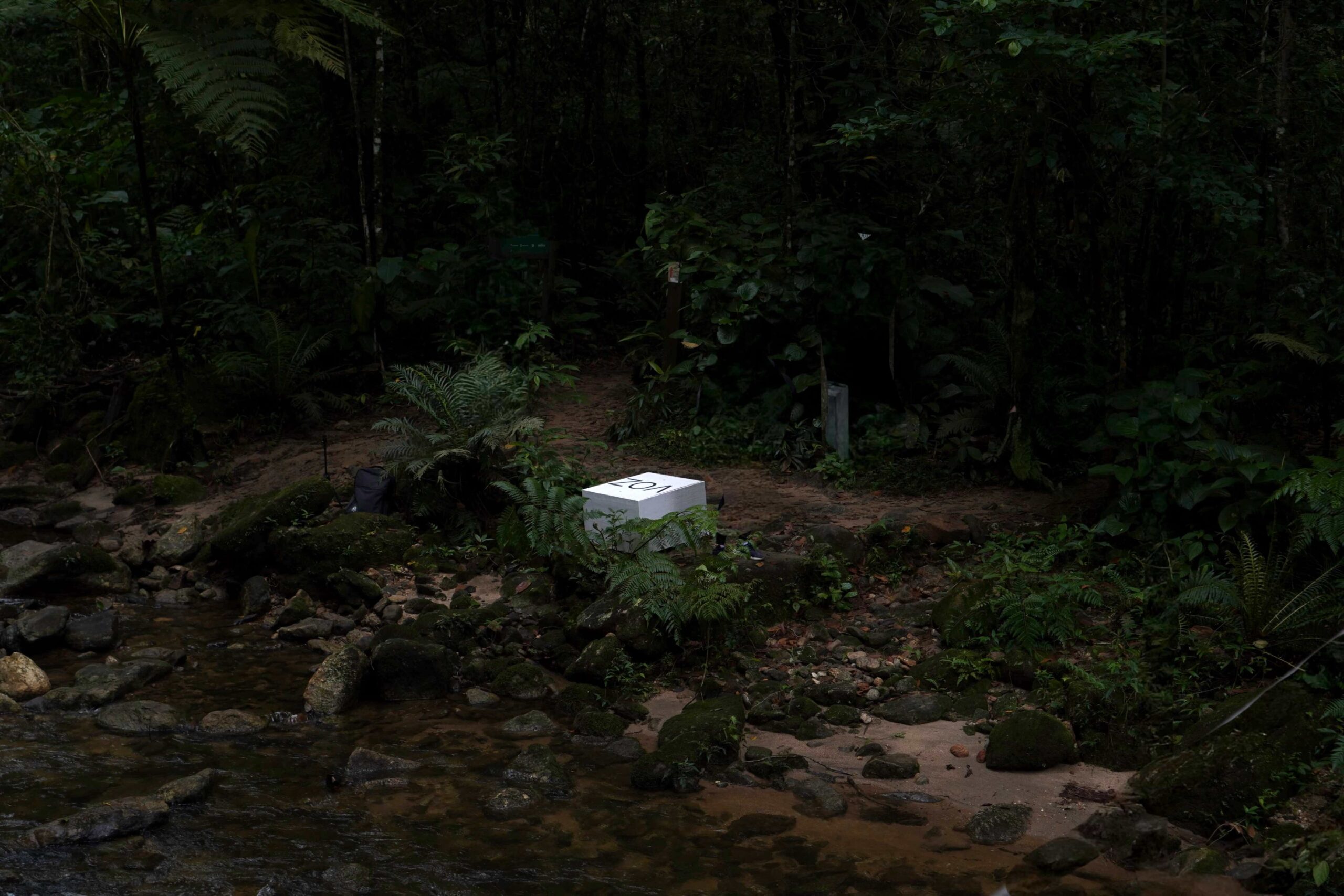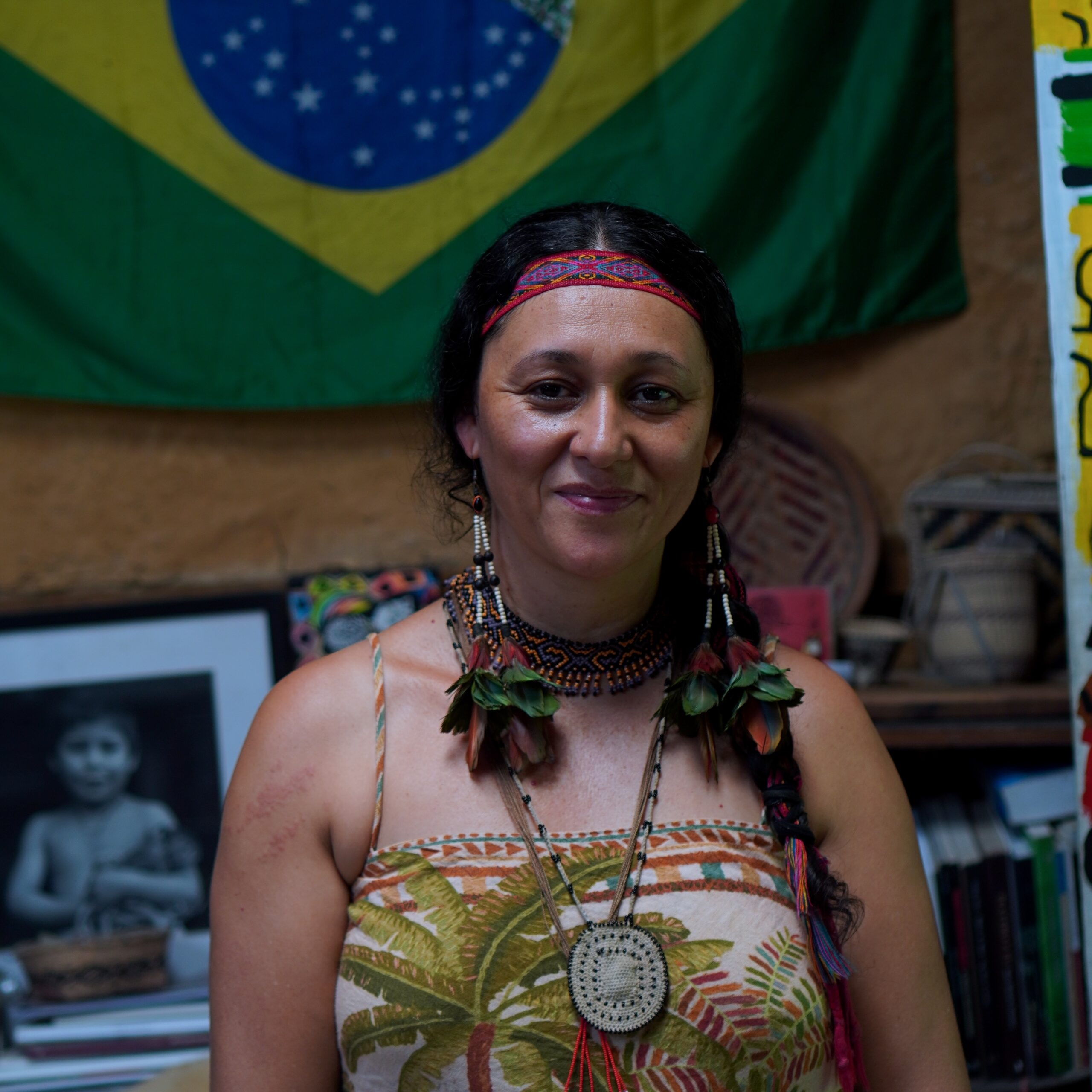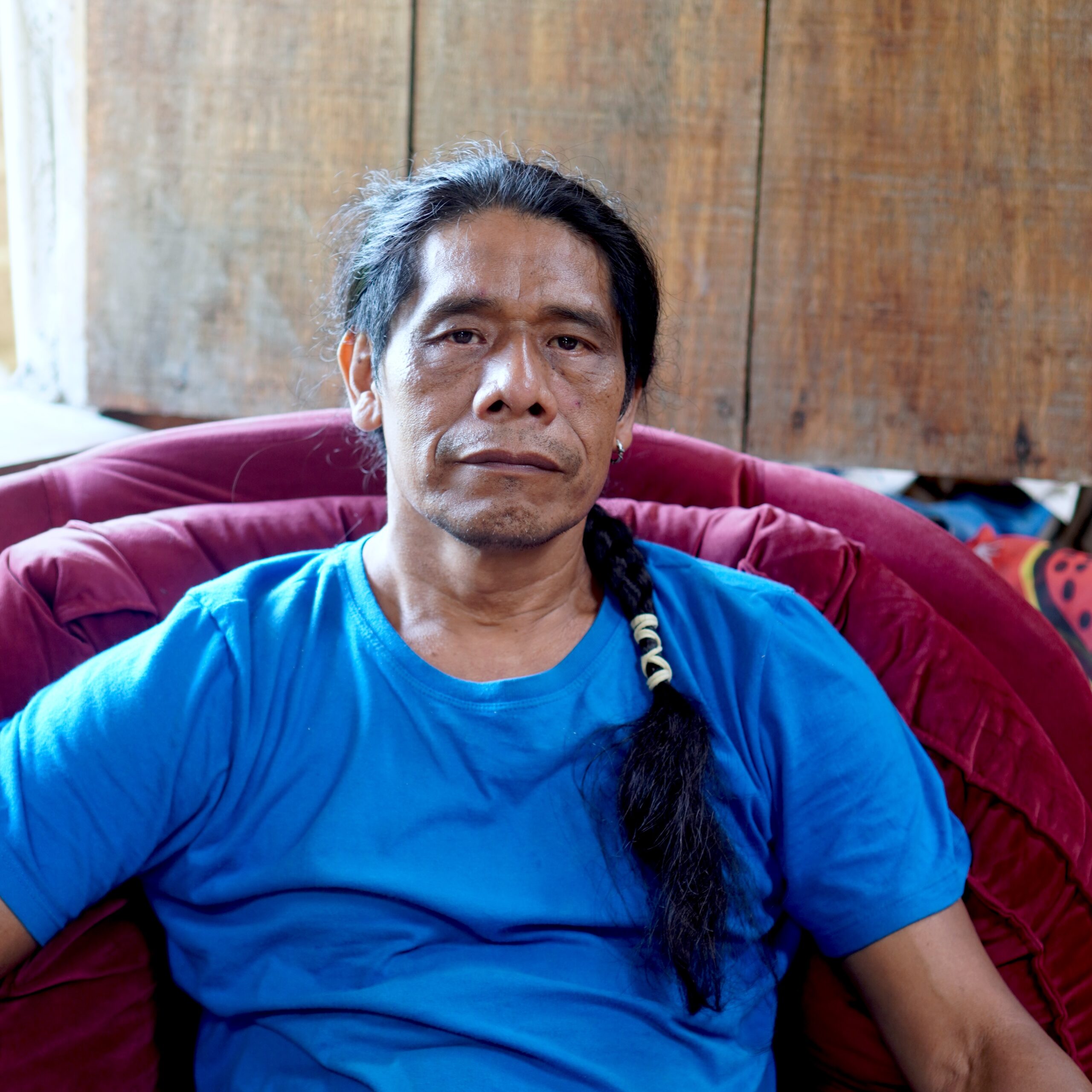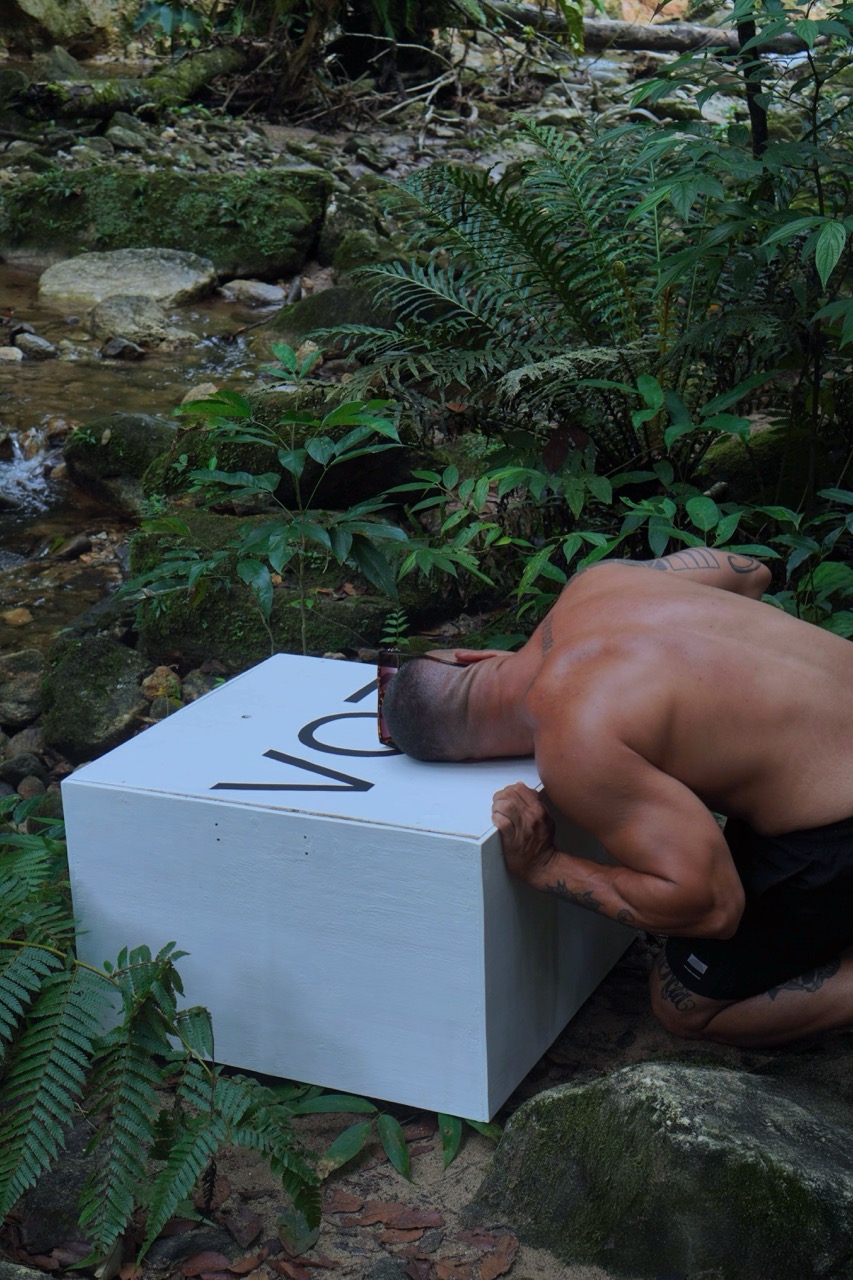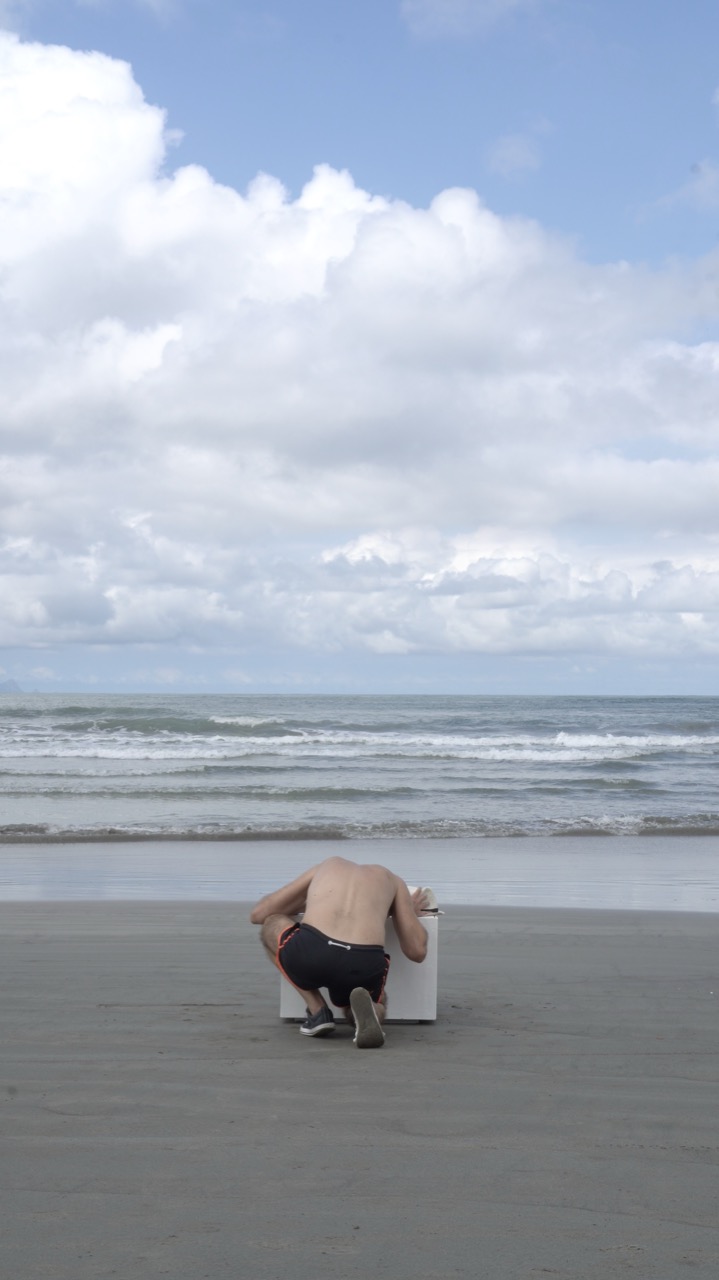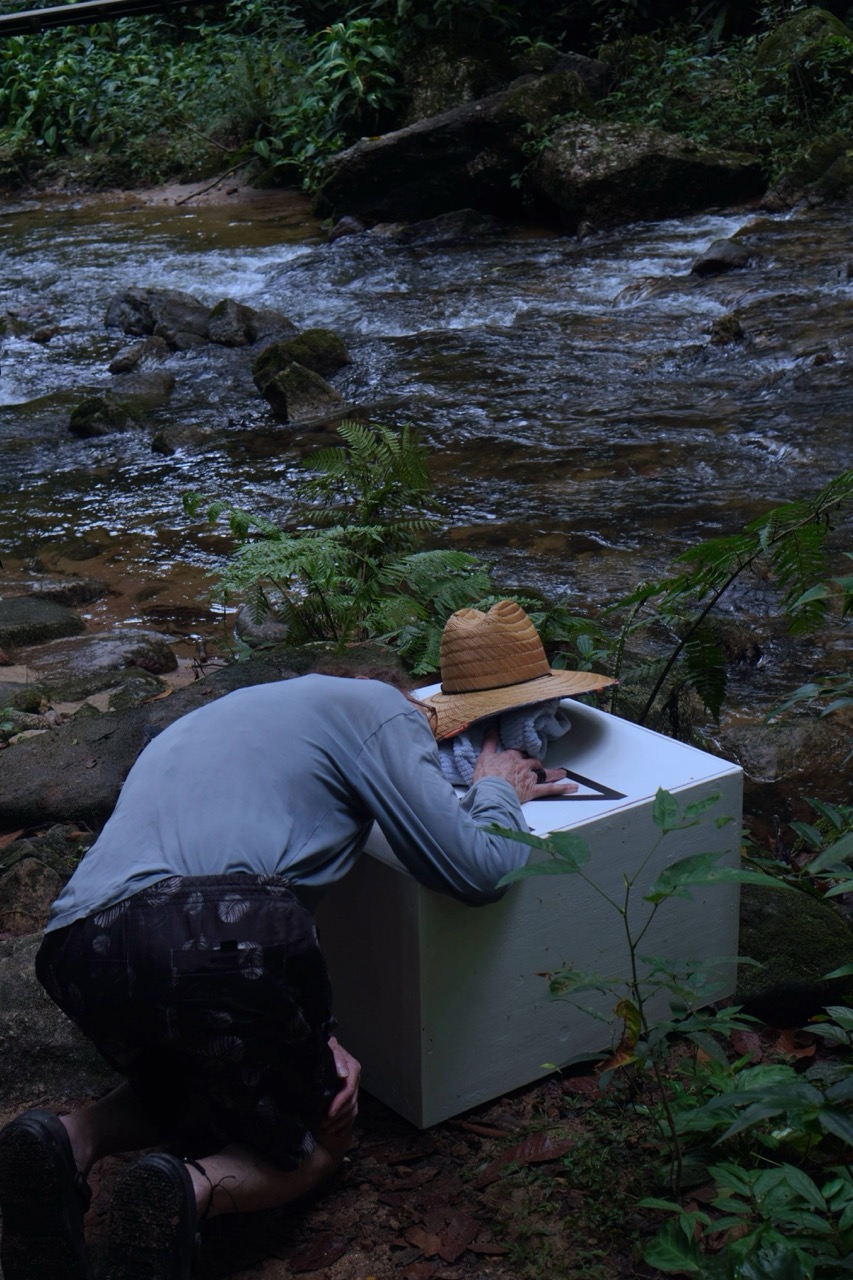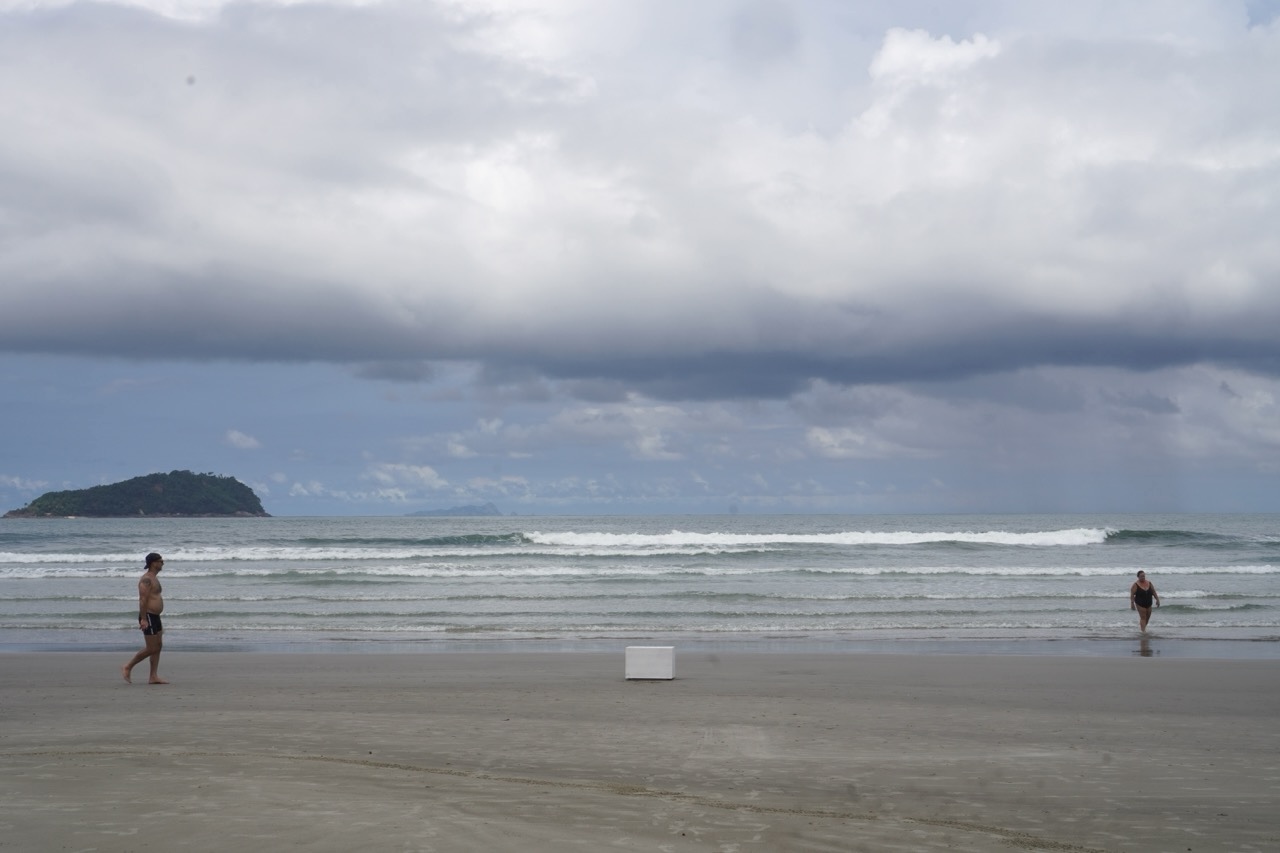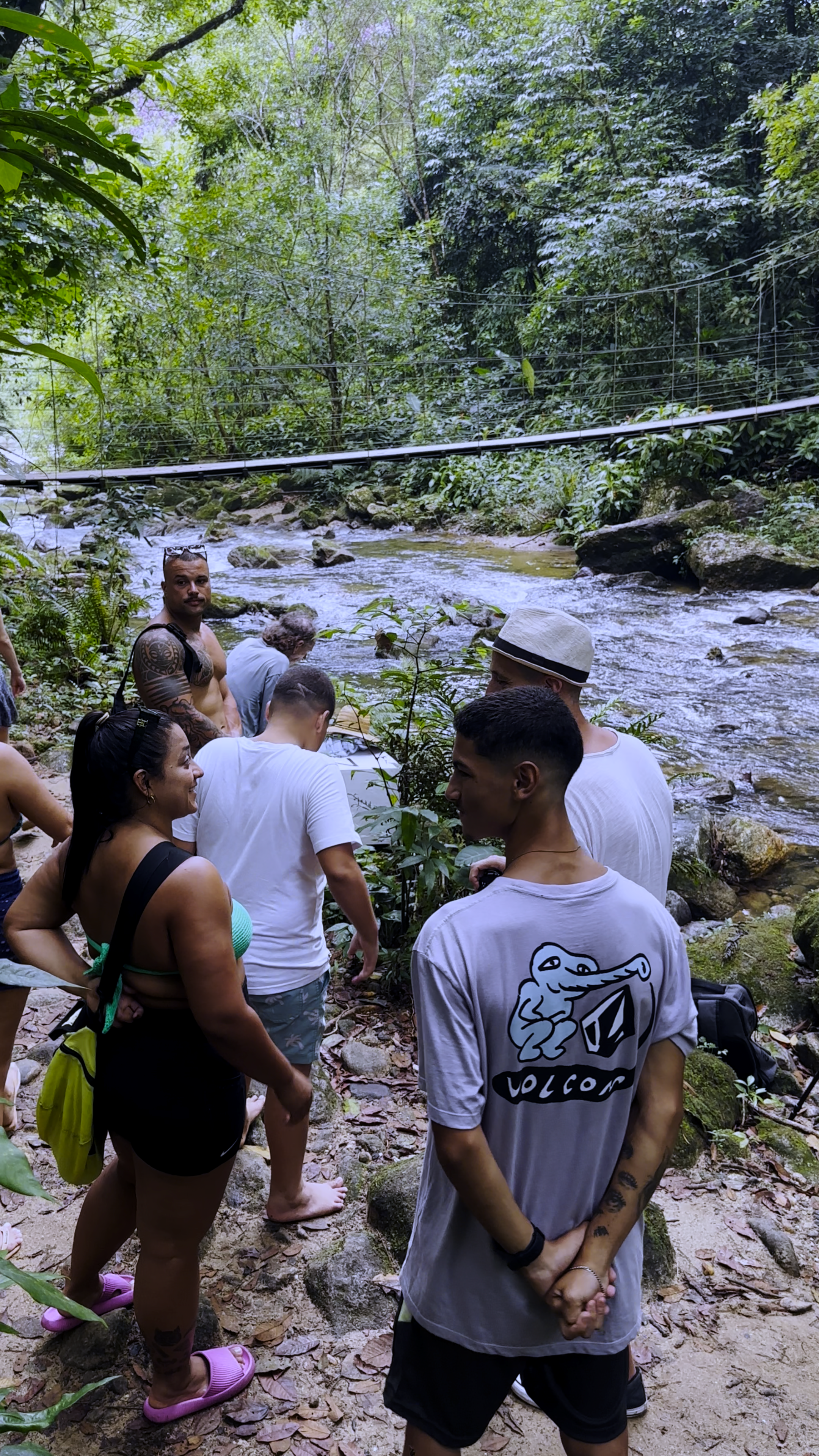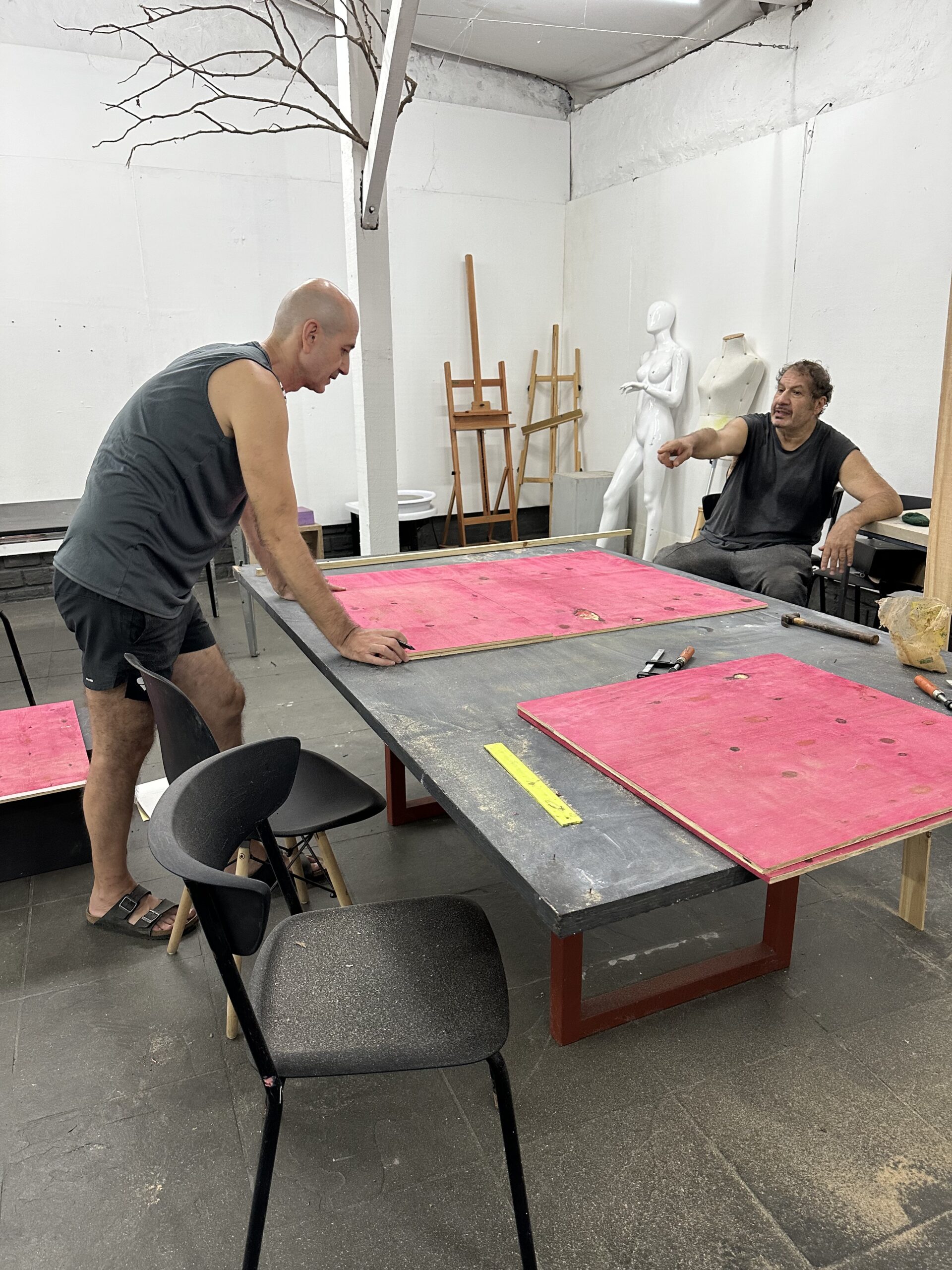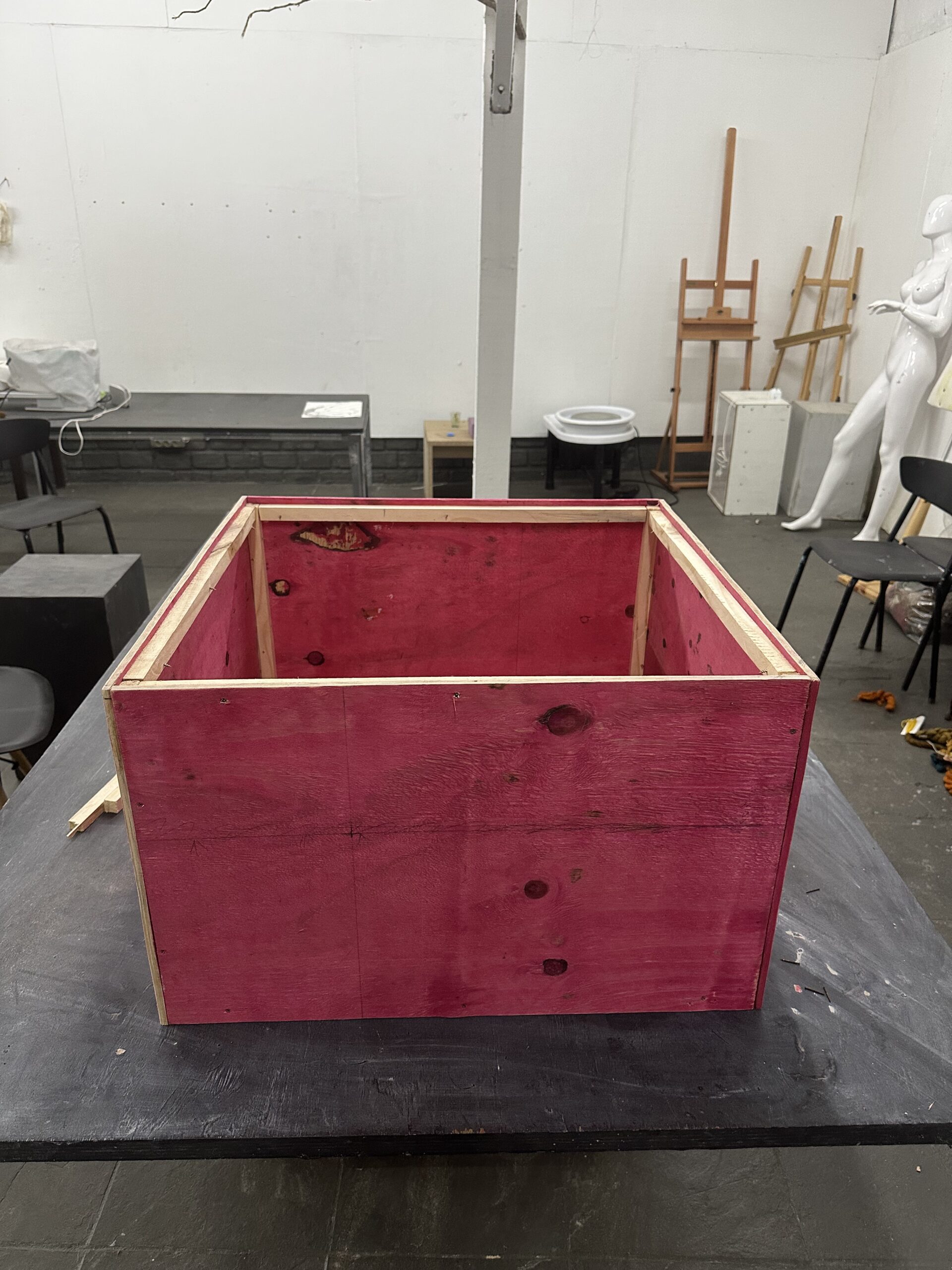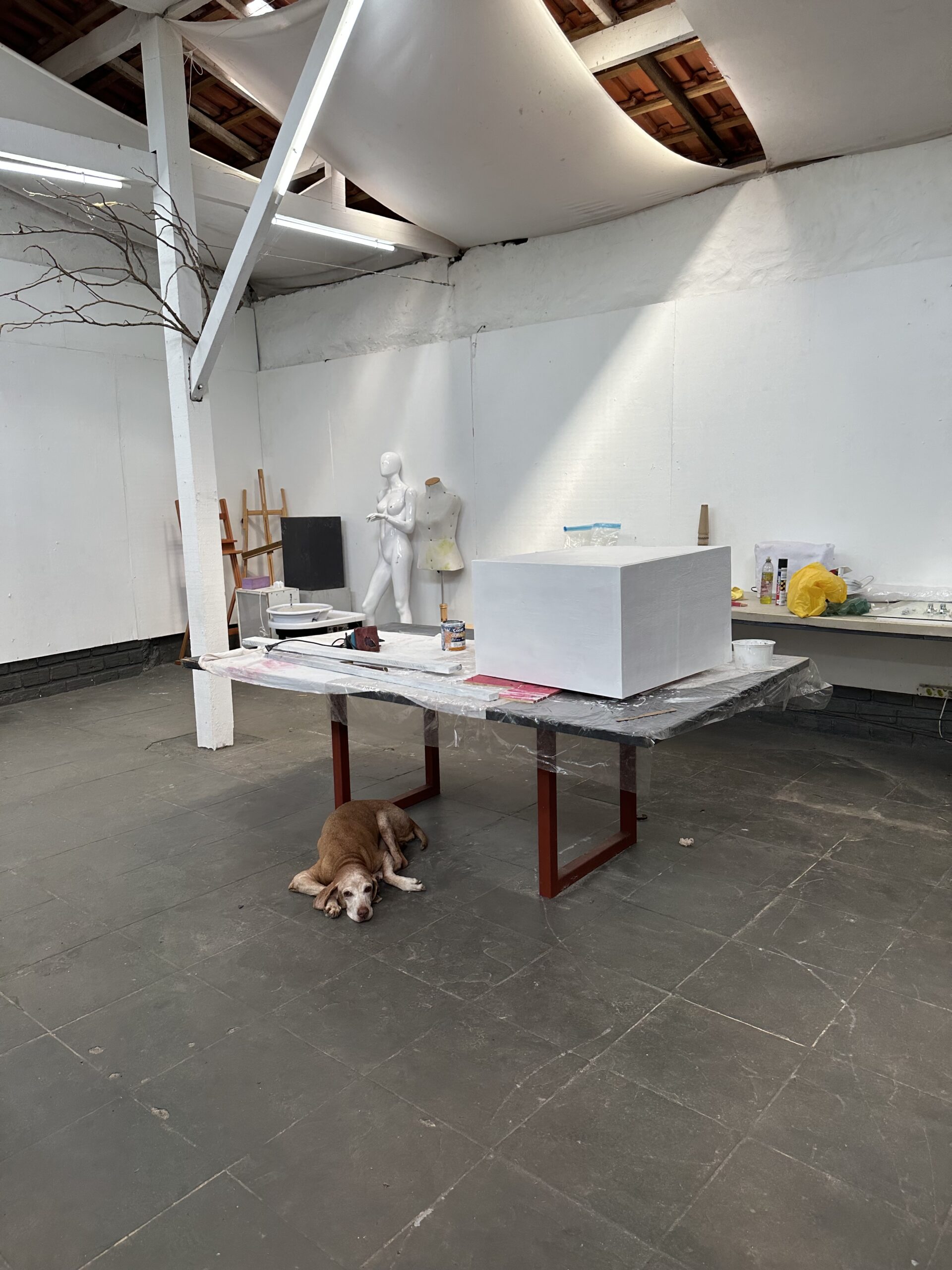Remi Picó © VOZ | Voice
VOZ | VOICE
[PR] À medida que as mudanças climáticas redefinem ecossistemas e sociedades, VOZ é uma instalação sonora que entrelaça perspectivismo, pós-humanismo e etnografia multiespécie para explorar o diálogo entre agentes humanos e não humanos no discurso climático. Inspirada no perspectivismo ameríndio (Viveiros de Castro), a obra reconhece os saberes indígenas, as comunidades locais, os elementos naturais e a inteligência artificial como vozes interagindo em uma paisagem sonora em constante transformação. A instalação gira em torno de uma pergunta central: “O que a Terra está nos dizendo?” Um algoritmo aleatório fragmenta e recompõe vozes humanas e sons ambientais dentro de uma caixa sonora, gerando uma interação dinâmica de perspectivas. Ao mover a caixa por diferentes locais, VOZ convida os participantes a questionar as narrativas antropocêntricas e a adotar uma compreensão mais pluralista das mudanças climáticas—uma compreensão que reconhece a agência e o conhecimento de atores humanos e não humanos. O projeto acontece em São Sebastião, São Paulo, Brasil, uma área de extraordinária relevância ecológica e cultural, situada entre a Mata Atlântica e o oceano. Além de ser um hotspot de biodiversidade, a região tem uma conexão profunda com a comunidade indígena Guarani. VOZ tornou-se realidade graças à Kaaysá Art Residency em Boiçucanga, São Sebastião, SP, Brasil, e às contribuições inestimáveis de Walter Arcela (Curador Convidado da Kaaysá Art Residency), Cristine Takuá e Carlos Papá da comunidade indígena Rio Silveira Guarani. Um agradecimento especial a Lourdina Jean Raben (Diretora da Kaaysá Art Residency) e a Tony Rabai pelo apoio essencial.
[EN] As climate change reshapes ecosystems and societies, VOZ (Voice) is a sound installation that weaves together perspectivism, posthumanism, and multispecies ethnography to explore the dialogue between human and non-human agents in climate discourse. Drawing inspiration from Amerindian perspectivism (Viveiros de Castro), the work acknowledges Indigenous knowledge, local communities, natural elements, and artificial intelligence as interacting voices within an ever-evolving soundscape.
The installation revolves around a central question: “What is the Earth telling us?” A randomized algorithm fragments and recomposes human voices and environmental sounds within a sound box, generating a dynamic interplay of perspectives. By relocating the box to different sites, VOZ invites participants to challenge anthropocentric narratives and embrace a more pluralistic understanding of climate change—one that recognizes the agency and knowledge of both human and non-human actors.
The project takes place in São Sebastião, São Paulo, Brazil, an area of extraordinary ecological and cultural significance, nestled between the Atlantic Forest and the ocean. Beyond being a biodiversity hotspot, the region is deeply connected to the Guaraní Indigenous community. VOZ was made possible thanks to the Kaaysá Art Residency in Boiçucanga, São Sebastião, SP, Brazil, and the invaluable contributions of Walter Arcela (Guest Art Curator at Kaaysá Art Residency), Cristine Takuá, and Carlos Papá from the Rio Silveira Guaraní Indigenous community. A heartfelt thanks goes to Lourdina Jean Raben (Director of Kaaysá Art Residency) and Tony Rabai for their essential support.
[IT] Mentre il cambiamento climatico ridefinisce ecosistemi e società, VOZ (Voce) è un’installazione sonora che intreccia prospettivismo, postumanesimo ed etnografia multispecie per esplorare il dialogo tra agenti umani e non umani nel discorso sul clima. Ispirandosi al prospettivismo amerindiano (Viveiros de Castro), l’opera riconosce le conoscenze indigene, le comunità locali, gli elementi naturali e l’intelligenza artificiale come voci interagenti in un paesaggio sonoro in continua trasformazione.
L’installazione ruota attorno a una domanda centrale: “Cosa la terra ci sta comunicando?”. Un algoritmo randomizzato frammenta e ricompone voci umane e suoni ambientali all’interno di una scatola sonora, creando un’interazione dinamica di prospettive. Spostando la scatola in diversi luoghi, VOZ invita a mettere in discussione le narrazioni antropocentriche e ad abbracciare una visione più pluralistica del cambiamento climatico, che riconosca l’agency e il sapere di attori umani e non umani.
Il progetto si sviluppa a São Sebastião, São Paulo, Brasile, un’area di straordinaria rilevanza ecologica e culturale, incastonata tra la foresta atlantica e l’oceano. Oltre a essere un hotspot di biodiversità, la regione è profondamente legata alla comunità indigena Guaraní. VOZ deve la sua realizzazione alla Kaaysá Art Residency di Boiçucanga, São Sebastião, SP, Brasile, e al prezioso contributo di Walter Arcela (Guest Art Curator presso Kaaysá Art Residency), Cristine Takuá e Carlos Papá della comunità indigena Rio Silveira Guaraní. Un sentito ringraziamento va a Lourdina Jean Raben (Direttrice di Kaaysá Art Residency) e a Tony Rabai per il loro supporto essenziale.
[EN] The planet Earth speaks many things through codes, but these are codes that are not taught in school. School teaches letters and numbers, but our elders teach us to listen to the voices of the Earth through the thunder, through the wind, through the rain, the ants, the bees. There are many voices that echo, but not everyone knows how to read these codes, how to decipher them. So for a long time, the spirits that inhabit the Earth have been telling us that we need to stop and listen, to reconnect, because I see that this capitalist society has made people disconnect from the essence of what we all are—because we, all humans, are children of the Earth. Recently, two years ago, there was a very heavy rain here on our coast, and this big rain caused a lot of destruction, many lives were lost, the Earth slid, and that night when it rained very heavily, we were gathered in a spiritual work at the prayer house that is here, and on that day I had a very deep vision of the Earth’s womb, all bleeding.
So the Earth spoke to us that night, saying that she is hurt, as if it were a cancer in the womb of the Earth. The Earth is deeply wounded. Some people call this climate change, eros noni, but it’s not just the climate—it’s many other things. The Earth is beginning to become unproductive because of the heat, the dirty waters of the rivers. Many species are no longer able to be born as they used to. Before, everything you planted in the Earth would sprout, and nowadays communities are facing a lot of difficulty because of this imbalance, this mess that was caused by the fact that, in Western thinking, the Earth became a commodity. All beings—the little stones, the little plants, the animals—everything became a commodity. But they are spirit. We are all spirit. We are energy. So when you unbalance this central core that is the Earth, and the beings that inhabit her, you create confusion, you create disharmony in the relationship and interaction with the whole. So I believe these voices, these messages that the Earth is giving us, require people to stop and learn to listen first—because listening, too, listening with attention, demands from us a sensitive concentration, traction. Because it’s no use listening and not acting—which is what is happening today. People know it’s wrong to eat meat every day because the meat comes from agribusiness that is destroying the forest—the Atlantic Forest. Here, the Nyeru is one of the most endangered forests on the planet. It was the Atlantic Forest that enriched Europe, through the beings that inhabit here. All this confusion, ever since the Treaty of Tordesillas—they transformed the sacredness of our forest into merchandise. And there was no respect, there was no dialogue. And today I’ve been talking a lot about the educational crisis—because the foundation of everything, I believe all of you went to school—but what do schools teach? They teach people to access the labor market. So listening to these messages from the Earth and what they tell us—about respect, about this very deep relationship, of a great web—because we believe that everything is connected, there is no disconnection on Earth. But the Western world fragments everything. Nature and culture, for the Western world, are not the same thing. For us, nature and culture walk entirely together. So there are many things, many layers we could talk about, but the messages from the Earth are very deep. Because this has been spoken about for a long time, but now everyone is desperate—because now we have truly reached the point of no return. We’ve reached a time when we will not witness the regeneration. But the Earth does regenerate. She is very sacred. But we humans—we will not have the strength to witness this regeneration.
[IT] Il pianeta Terra comunica molte cose attraverso codici, ma questi codici non vengono insegnati a scuola. La scuola insegna lettere e numeri, ma i nostri anziani ci insegnano ad ascoltare le voci della Terra attraverso i tuoni, il vento, la pioggia, le formiche, le api. Ci sono molte voci che riecheggiano, ma non tutti sanno leggere questi codici, decifrarli. Da molto tempo, gli spiriti che abitano la Terra ci dicono che dobbiamo fermarci ad ascoltare, a riconnetterci, perché vedo che questa società capitalista ha fatto sì che le persone si disconnettessero dall’essenza di ciò che tutti noi siamo—perché noi, tutti gli esseri umani, siamo figli della Terra. Recentemente, due anni fa, c’è stata una pioggia molto forte qui sulla nostra costa, e questa grande pioggia ha causato molte distruzioni, molte vite sono state perse, la Terra è franata, e quella notte, quando ha piovuto molto forte, eravamo riuniti in un lavoro spirituale nella casa di preghiera che è qui, e quel giorno ho avuto una visione molto profonda del grembo della Terra, tutto sanguinante. Quella notte, la Terra ci ha parlato, dicendo che è ferita, come se avesse un cancro nel grembo. La Terra è profondamente ferita. Alcuni chiamano questo cambiamento climatico, eros noni, ma non è solo il clima—sono molte altre cose. La Terra sta iniziando a diventare improduttiva a causa del calore, delle acque sporche dei fiumi. Molte specie non riescono più a nascere come una volta. Prima, tutto ciò che piantavi nella Terra germogliava, e oggi le comunità stanno affrontando molte difficoltà a causa di questo squilibrio, di questo caos causato dal fatto che, nel pensiero occidentale, la Terra è diventata una merce. Tutti gli esseri—le piccole pietre, le piccole piante, gli animali—tutto è diventato una merce. Ma loro sono spirito. Noi siamo tutti spirito. Siamo energia. Quindi, quando si sbilancia questo nucleo centrale che è la Terra, e gli esseri che la abitano, si crea confusione, si crea disarmonia nella relazione e nell’interazione con il tutto. Quindi, credo che queste voci, questi messaggi che la Terra ci sta dando, richiedano che le persone si fermino e imparino prima ad ascoltare—perché anche l’ascolto, l’ascolto attento, richiede da noi una concentrazione sensibile, trazione. Perché non serve a nulla ascoltare e non agire—che è ciò che sta accadendo oggi. Le persone sanno che è sbagliato mangiare carne tutti i giorni perché la carne proviene dall’agrobusiness che sta distruggendo la foresta—la Foresta Atlantica. Qui, la Nyeru è una delle foreste più minacciate del pianeta. È stata la Foresta Atlantica ad arricchire l’Europa, attraverso gli esseri che la abitano. Tutta questa confusione, sin dal Trattato di Tordesillas—hanno trasformato la sacralità della nostra foresta in merce. E non c’è stato rispetto, non c’è stato dialogo. E oggi parlo molto della crisi educativa—perché la base di tutto, credo che tutti voi siate andati a scuola—ma cosa insegnano le scuole? Insegnano alle persone ad accedere al mercato del lavoro. Quindi, ascoltare questi messaggi della Terra e ciò che ci dicono—sul rispetto, su questa relazione molto profonda, di una grande rete—perché crediamo che tutto sia connesso, non c’è disconnessione sulla Terra. Ma il mondo occidentale frammenta tutto. Natura e cultura, per il mondo occidentale, non sono la stessa cosa. Per noi, natura e cultura camminano completamente insieme. Quindi, ci sono molte cose, molti strati di cui potremmo parlare, ma i messaggi della Terra sono molto profondi. Perché se ne parla da molto tempo, ma ora tutti sono disperati—perché ora abbiamo veramente raggiunto il punto di non ritorno. Siamo arrivati a un momento in cui non assisteremo alla rigenerazione. Ma la Terra si rigenera. È molto sacra. Ma noi esseri umani—non avremo la forza di assistere a questa rigenerazione
[EN] The Earth is beginning to wake up, to stretch. And through this awakening of the Earth, many changes will come, and a few people will become very aware. These few people will feel the awakening of the Universe in a very peaceful way, while others who don’t understand it will fall into despair. And the conscious ones will realize that this is a time to reach a higher awareness. And that awareness is coming, but only for a few. [IT] La Terra sta cominciando a svegliarsi, a stirarsi. E attraverso questo risveglio della Terra, arriveranno molti cambiamenti, e poche persone diventeranno davvero consapevoli. Queste poche persone sentiranno il risveglio dell’Universo in modo molto pacifico, mentre altre, che non lo comprenderanno, cadranno nella disperazione. E coloro che sono coscienti capiranno che questo è un tempo per raggiungere una consapevolezza più elevata. E quella consapevolezza sta arrivando, ma solo per pochi.

